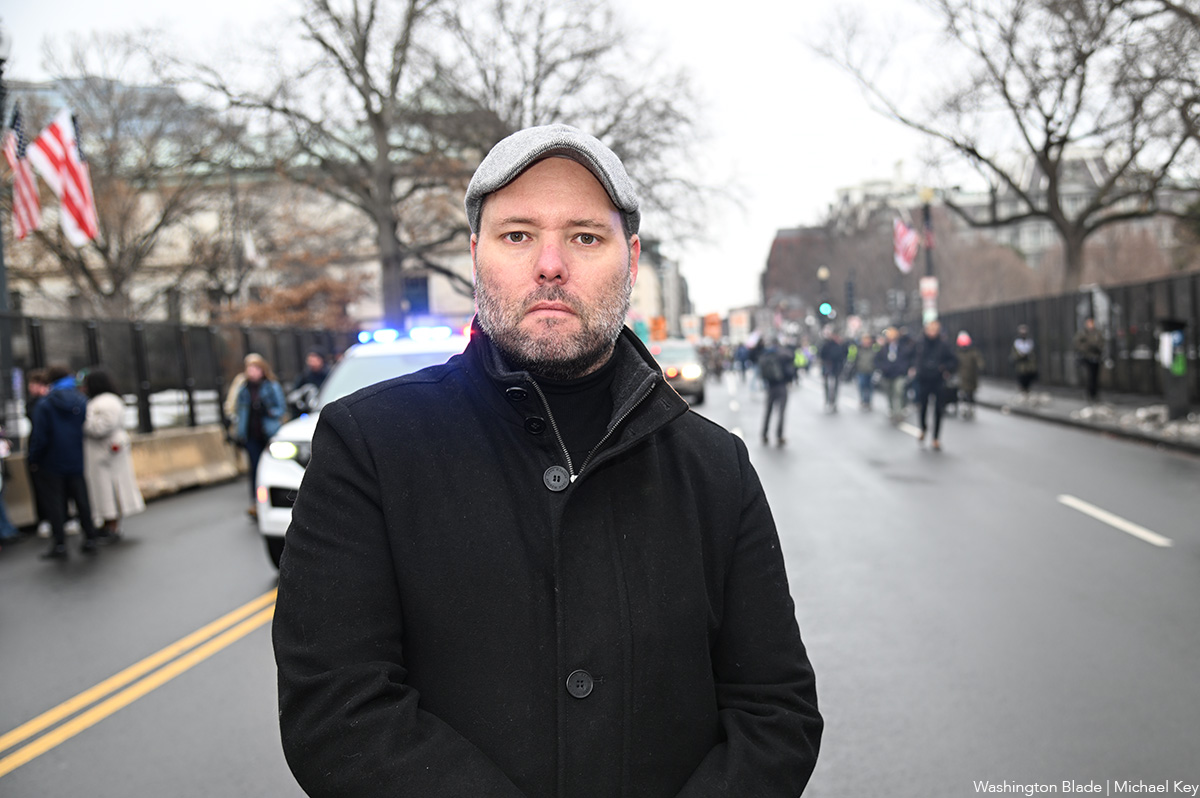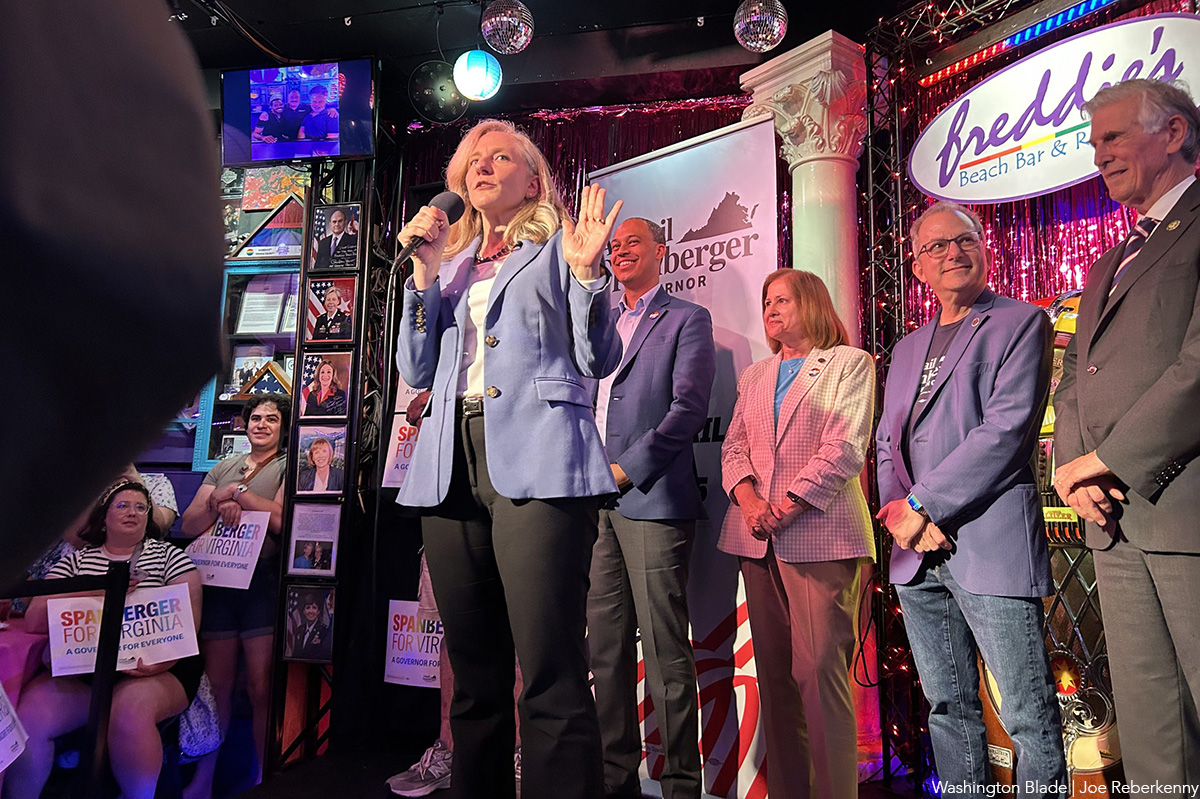News
Gay, bi lawmakers criticized for joining GOP on Obamacare vote
Sinema, Maloney sought to delay individual mandate


Rep. Kyrsten Sinema (D-Ariz.) and Rep. Sean Patrick Maloney are incurring the wrath of gay activists for voting with House Republicans. (Photo of Sinema courtesy the Sinema campaign; Washington Blade photo of Maloney by Michael Key).
Two Democratic members of Congress — one gay and one bisexual — are incurring the wrath of LGBT activists for voting with House Republicans to delay certain portions of Obamacare in exchange for keeping the government in operation.
Reps. Sean Patrick Maloney (D-N.Y.) and Kyrsten Sinema (D-Ariz.) were among nine Democrats on Monday who voted for a Republican-led resolution that provided funds for the government for fiscal year 2014, but included a provision delaying the individual mandate and requiring members of Congress and their staffs to pay the full cost of insurance without the government subsidy.
Additionally, Maloney voted for another measure that includes the above policy items in addition to calling for a conference committee with the Senate, which would likely mean some give on health care reform.
Both Maloney and Sinema also joined Republicans on Sunday to vote for repeal of the tax on medical devices as part of Obamacare.
Each House proposal was rejected by the Senate, which has insisted on a bill that only continues funding for the government, leading to the stalemate that caused the government shutdown on Tuesday.
Michael Rogers, a D.C.-based LGBT rights advocate, said the vote means Sinema and Maloney are Democrats in name only.
“I am a progressive so I wish Sinema and Maloney were more concerned about the American people than with their reelection,” Rogers said. “When Democrats stand for Democratic principles we win. If these two people won as out LGBT people, surely they would not have been tossed out sticking with their caucus. It is sellouts like Sinema and Maloney who, as DINOs, are more than willing to cave in to the crazy demands of the right.”
Michaelangelo Signorile, a gay New York activist and radio host on SiriusXM, took to Twitter to express his indignation.
Gay ConservaDems took $$ from progressives, Sinema and Maloney, voted #shutdown. Make sure they meet fate of Christine Quinn @DenisDison
— Michelangelo Signorile (@MSignorile) October 1, 2013
John Aravosis, who’s gay and editor of AMERICAblog, also had harsh words for the two lawmakers, who ran as openly gay/bi candidates and took donations from the LGBT community.
“I think it’s abominable,” Aravosis said. “No Democrat, let alone a gay or bisexual one, should be working to undercut health care protections for Americans, let alone helping John Boehner do anything.”
The other openly gay lawmakers in the U.S. House — Reps. Jared Polis (D-Colo.), David Cicciline (D-R.I.), Mark Takano (D-Calif.) and Mark Pocan (D-Wis.) — didn’t join Maloney or Sinema in these votes.
Maloney and Sinema voted against the most drastic proposal from House Republicans to attach a one-year delay of health care reform to the spending bill for fiscal year 2014.
In a statement, Maloney defended his vote for delaying the individual mandate by pointing to the administration.
“I strongly support the president’s decision to give employers more time to comply with the law, and I believe that we should give families the same flexibility we’re giving to our small businesses,” Maloney said.
Maloney also explained his support for eliminating health care subsidies for government employees by saying the playing field for public and private workers should be equal.
“Families and businesses in the Hudson Valley are not getting special subsidies from Obamacare and neither should members of Congress or the White House,” Maloney said.
In a separate statement, Sinema defended her votes by saying they ensure individuals can sign up for health care plans without “being punished” for failing to purchase adequate healthcare coverage.
“It’s now been proven that too many states are not ready to implement the marketplaces,” Sinema said. “It’s not fair to punish people who don’t have the information they need to make informed decisions. Arizona’s hard-working families need transparency and certainty about this healthcare law and its implementation. A one-year delay of the individual mandate will ensure that Arizonans get that certainty.”
Sinema also said health care subsidies for government employees shouldn’t happen with a government shutdown in effect.
“Additionally, I supported tonight’s amendment because members of Congress should not ask the government to pay for their healthcare while Americans at home suffer during government shutdown,” Sinema said.
Neither the office of House Minority Leader Nancy Pelosi (D-Calif.) nor the Democratic National Committee responded to the Blade’s request for comment on Sinema and Maloney joining House Republicans. Shin Inouye, a White House spokesperson, is on furlough and unable to respond to media requests.
The Gay & Lesbian Victory Fund, which endorsed the openly gay/bi candidates and called for donations from LGBT people for the candidates, didn’t respond to a request for comment. The Human Rights Campaign also endorsed both candidates and didn’t immediately respond to a request for comment.
Sinema and Maloney have been active on LGBT-specific issues since their election to Congress. They voted for an LGBT-inclusive version of the Violence Against Women Act reauthorization and signed a friend-of-the-court brief urging the U.S. Supreme Court to strike down the Defense of Marriage Act.
Dana Beyer, a Chevy Chase, Md.,-based transgender activist, said the LGBT community shouldn’t judge Sinema and Maloney too harshly for their votes because “these late night political machinations are generally theater” and don’t say anything about the lawmakers’ overall voting records.
“This issue isn’t about the LGBT community; it’s about America,” Beyer said. “They should be judged on a much broader set of criteria and values than this one vote, and I hope people take the context into account.”
Minnesota
Tim Walz drops out of Minn. governor’s race
The longtime LGBTQ ally and Democratic party figure blames ongoing fraud investigations supported by Trump and the GOP for his withdrawal.

Minnesota Gov. Tim Walz announced Monday that he is withdrawing from the 2026 Minnesota governor’s race, citing what he described as political interference and attacks from Republican Party leaders.
Walz made the announcement on social media, where the post quickly gained traction, drawing more than 30,000 likes on Instagram and 23,000 reactions on Facebook.
In his statement, the incumbent governor directly blamed former President Donald Trump and his allies, both in Washington and in Minnesota, for fueling what he characterized as politically motivated accusations of widespread fraud tied to federal nutrition programs in the state.
According to a 2024 ABC News story, more than 70 people have been charged as part of a “wide-ranging criminal conspiracy” that allegedly exploited two federally funded nutrition programs during the COVID-19 pandemic, resulting in more than $250 million in fraudulent claims.
“I won’t mince words here,” Walz wrote. “Donald Trump and his allies — in Washington, in St. Paul, and online — want to make our state a colder, meaner place. They want to poison our people against each other by attacking our neighbors. And, ultimately, they want to take away much of what makes Minnesota the best place in America to raise a family.”
In his announcement, Walz also cited recent reports from Somali American child care center operators in Minnesota who said they have faced violent threats and vandalism after right-wing YouTuber Nick Shirley posted a video alleging fraud at their facilities. Following the video’s release, the Trump-Vance administration cut federal child care funding nationwide.
Walz also criticized the federal government’s decision to withhold child care funding from states amid the allegations.
“They’ve already begun by taking our tax dollars that were meant to help families afford child care,” he added. “And they have no intention of stopping there.”
Last week, a Department of Health and Human Services official confirmed that the Trump administration is pausing child care funding to all states following the Minnesota allegations, stating that funds will be released “only when states prove they are being spent legitimately.”
“Republicans are playing politics with the future of our state,” Walz said. “And it’s shameful.”
Walz previously served as the Democratic vice presidential nominee alongside then–Vice President Kamala Harris during her unsuccessful 2024 presidential campaign.
Meanwhile, longtime Trump ally and MyPillow CEO Mike Lindell announced in December that he is running for Minnesota governor and has already received Trump’s endorsement.
Walz has been a longtime ally of the LGBTQ community, dating back to 1999, when he served as a football coach and teacher at Mankato West High School in Mankato, Minnesota, about 80 miles southwest of Minneapolis.
It is also possible that U. S. Sen. Amy Klobuchar (D-Minn.) is considering entering the race to succeed him.
Colombia
Blade travels to Colombia after U.S. forces seize Maduro in Venezuela
Former Venezuelan president, wife seized on Saturday

Washington Blade International News Editor Michael K. Lavers will be on assignment in Colombia through Jan. 10.
Lavers arrived in Bogotá, the Colombian capital, on Monday. American forces two days earlier carried out an overnight operation and seized now former Venezuelan President Nicolás Maduro and wife, Cilia Flores, at their home in Caracas, the Venezuelan capital.
Maduro and Flores on Monday pled not guilty to federal drug charges in New York.
Maduro in 2013 became Venezuela’s president after his predecessor, Hugo Chávez, died.
The country’s ongoing economic and political crises have prompted millions of Venezuelans to flee to neighboring Colombia and other countries throughout Latin America and around the world. The seizure of Maduro and Flores threatens to further destabilize Venezuela and the broader region.
The Washington Blade, which has reported from Colombia several times over the last decade, has interviewed several LGBTQ Venezuelan opposition leaders. The Blade has also extensively covered the plight of LGBTQ Venezuelans and Venezuelans with HIV/AIDS who have left their country because of violence, persecution, discrimination, and a lack of medications.
“LGBTQ Venezuelans in Colombia and elsewhere have a unique perspective on the events that have transpired in their homeland over the last two days, and how they continue to reverberate throughout the hemisphere,” said Lavers. “It is critically important for the Washington Blade to document the situation in the region as it continues to evolve and to show how it will impact LGBTQ communities.”
“The Blade has a long history of covering the plight of LGBTQ communities around the world and this trip reflects our commitment to the region,” said Blade Editor Kevin Naff. “This reporting will help shine a light on the challenges facing LGBTQ Venezuelans and those living with HIV and how they are coping with the unfolding events.”
Lavers last reported from Colombia in 2021. His coverage included a trip to Cúcuta, a Colombian city that is on the country’s border with Venezuela.
Virginia
LGBTQ groups to join Spanberger inaugural parade
Virginia Pride among more than 25 orgs to march in Jan.17 event

Virginia Gov.-Elect Abigail Spanberger’s inaugural committee announced on Jan. 2 that at least two LGBTQ organizations will be among more than 25 state-based organizations, including marching bands, that will participate in her inaugural parade on Jan. 17.
A statement released by the inaugural committee says the parade will take place immediately after Spanberger is sworn in as Virginia’s 75th governor and delivers her inaugural address in Richmond.
The statement lists the LGBTQ groups Equality Virginia and Diversity Richmond as two groups participating in the parade, although the two groups merged in 2021, with Virginia Pride becoming a project of Diversity Richmond. Among other things, Virginia Pride organizes Richmond’s annual LGBTQ Pride events.
“A display of the impressive talent and beauty of every corner of Virginia, our inaugural parade will be a celebration of all that makes our Commonwealth strong,” Spanberger said in the Jan. 2 statement. “I’m excited for attendees in the stands on Capitol Square and families watching together at home to see this incredible showing of Virginia pride,” she said.
James Millner, who serves as executive director of Virginia Pride, told the Washington Blade about 75 people are expected to join the Virginia Pride-Diversity Richmond contingent in the parade. He said among them will be members of other Virginia LGBTQ organizations.
“We’re going to invite our staff, our board, our volunteers, and our community partners to join us,” Millner said.
“We are thrilled and honored to have been invited to participate in Abigail Spanberger’s inauguration festivities,” he added. “I think this represents a marked change from the previous administration and demonstrates what she campaigned on – which is she sees the diversity of the Commonwealth as a strength that needs to be celebrated,” he said. “And we are very happy that she has invited us to represent the diversity of the commonwealth.”
Millner appeared to reflect on the sentiment of the large majority of Virginia’s LGBTQ community in its support for Democrat Spanberger over Republican Lt. Gov. Winsome Earle-Sears in the November 2025 Virginia election and the end of incumbent GOP Gov. Glenn Youngkin’s term in office on Jan. 17.
“After what we’ve been through with the Younkin administration, especially in its treatment of LGBTQ folks, especially transgender and nonconforming folks, I think we are all breathing easy and excited about what opportunities will exist in working with Abigail Spanberger,” he told the Blade.



















